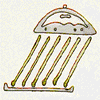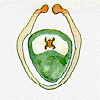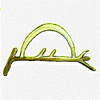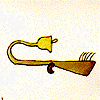Robert Lietz
Getting Out
"We are young; we don't have time."
--Miss Prcic, considering the negotiations for peace and the effects of the U.N. bombing raids on Bosnian Serb targets.
I
Maybe the skates, ski-runs, the village booths
where these had put their kisses up for sale,
inviting the breath from all of us, and courtesies
from men who brought themselves indoors
from rim-weathers, anything maybe, refreshing
the heart with latitudes, a right word
cross-purposed with the codes and sympathies; and he,
remembering the sleds, unable to forget
the hands and mittens cut away with fingers,
attempts to soothe himself with beers
or with the ciders hands around him lift
from maplewood, considering
the kinds of getting out, the shoulder there, the hand
or eye that might be taken for completion,
and people rubbing themselves with cloths,
to bring their features up, more vital
with fresh light projecting from the stone face,
and at such latitudes, and over
the body-sewn pools, the place where rapids
build around the heart, and the ghosts
ascending, rubbery and white, mean to relieve
or readdress the restorations, to build
for themselves another language of critique.
Maybe you use the thing too much.
Maybe you hoard or spare, for every murmur
and what then, attending valuables,
the plated or bound thing, the heart and hand,
the squiggle-prints of blood
delivered by rain to other contexts, naming
instruments, with pasts to mind,
and gossip to mind among the kinds
of getting out, entered as the light
seen spill across one more
indifferent field.
II
So what's the oddity? And where's the creature
so inspired at its mischief,
seeking another round, another garden walk,
behind the walls he's ordered
and ordered down in time, for all the berrying there
and so much else besides, all the rounds of flesh
to name and colors ripening?
Unable to feed or even say the hungers once.
Unable to fill the appetite, the strange flared sense
of having stayed with them too long,
assembled with them, sat stoops, and stood and thinned away,
accomplishments to tell, to calculate again,
to circulate and take the sense of properties,
of brows and beards, until
the sampling's enough, the fingered stops
and spans affecting daylight.
Monday will do for all of them, inflecting
origins or anybody's touch, as if a man should seem
no less than his believing,
the bone-debris no less than birthday wishes
for the grandchildren.
Even the syllables attain a kind of prominence,
the mica and cloudwork, the yellowing
and greens achieved, where the likes of these
would nod above the windy instruments,
swept up by this more corporal
and more noisesome genesis.
III
He steps to the yard, steps in, brightly fumbling
at the orange or neutral upholstery,
as if he were light itself, at edge with influence,
exploring the fists of greenery
and breath enlivened by strong coffee, falling as allowed
among the ferns and over the peach biscuits,
among the likes of these, the faces put on for the business,
more smooth where creases were, reaching into
and under crusts and through the climates of desire,
assembling influence, addressing the light
with all the indifference of cashiers.
He steps among them after all, listens to the guarantees
and men who file away the guarantees,
advancing desire in common tongues, leaving
their mark in the playbook
and capacities to access, rubbing the leathers
and sorting grains, as if they might regret
the tones, regret the partnerships, the interests
laid to view in seller's light.
He means and stipulates and means, chewing his fingers
over scores, to straighten the ways
a heart had ruined itself in serving mentors,
reaching among crowed stars,
hearing the voices weave and more sustaining
instruments. They package themselves
as getting out, and, in this cobalt deepening
over cratered marginland,
voices lost as that endeavoring blue drops over them,
and lost among the girded planets
and jeweled moons.
IV
Had men conceived this windy anything?
Would childflesh, raised up to scold
the features left to them, be spent in spasms still,
as someone checks his watch
or someone reads a mirror, straightens
and smoothes a tie, or someone
looks away, watching as crews clear out,
speaking to themselves as tulips
stand up to report, summing the grim foundations in Dutch light?
--Seasons, stretched as metaphor,
shock Time, and tournament intensities,
filling this land where marvels hatched,
where moons came measurably and flattened afterward,
leaving to each the deep
decanted mystery. He gazes into light,
steps in from all of it, leaving behind
that stricken, sharp-obstacled terrain, joining
the rest of them for words,
as hard as words have been to come by, astonishing
the likes of these to scale,
as if it were chimney-smoke conspiring
to bring the chimneys down,
and the words themselves, familiarly exchanged,
were squeezed to seem the features of machines,
enabling men again to speak
of licenses and time-cards, of affordable rents
and of agreements to be married.
--That any one of them, his complicities put by,
and blames put by
as village condensations, any one of them
should stand, blue-lipped and shivering,
before the presence of patrols, or here with him
among the parties of survivors,
figuring not so long, squinting at pond's glow
or at reports on the horizon,
the prods of light become their own
articulate advance, and woods
and wildlands, and all the Sundays
men had spent their faiths
to wager on.





